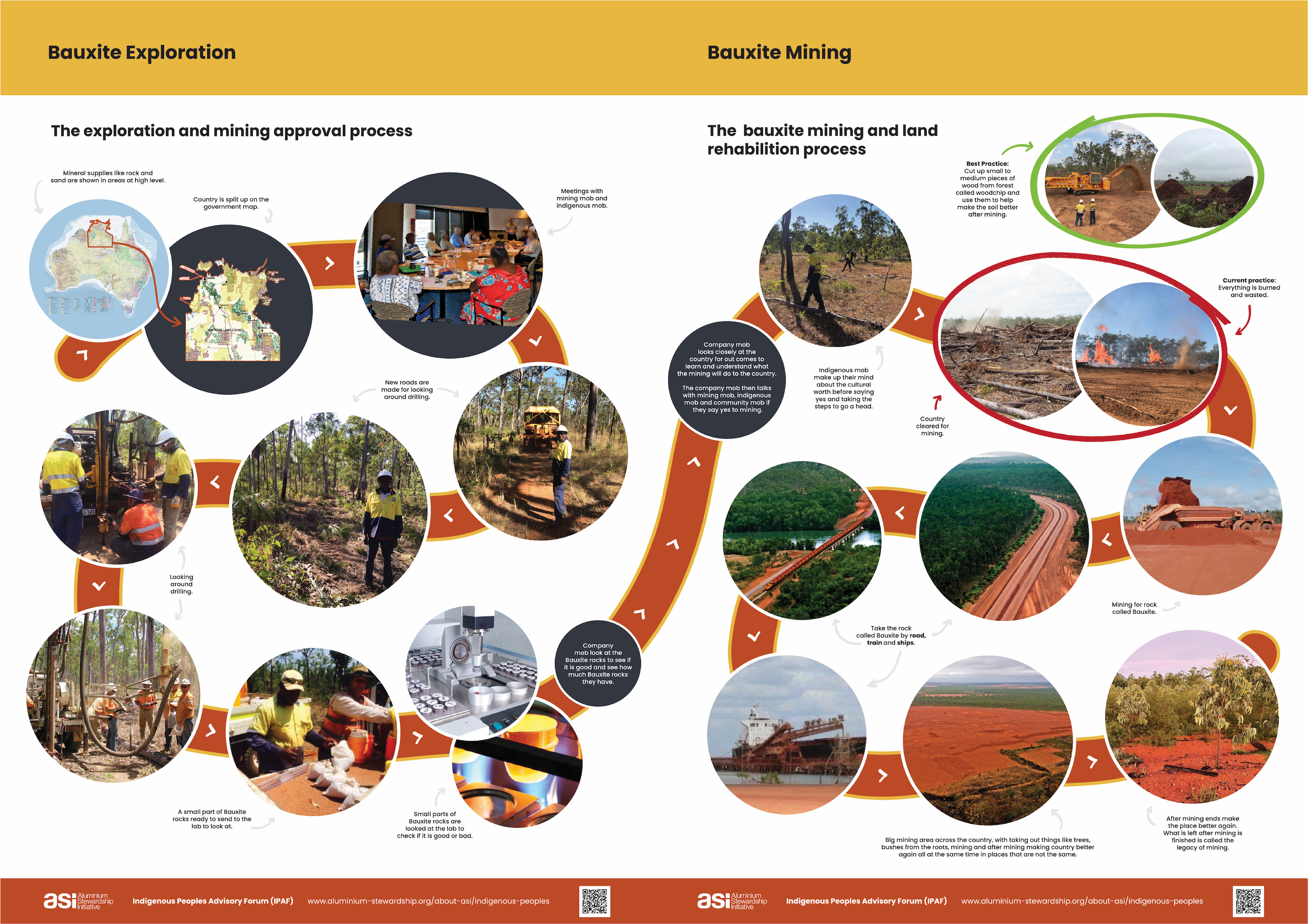IPAF Bauxite Exploration & Mining Workshops – Cape York Peninsula & Elcho Island, October & November 2022
The ASI Indigenous Peoples Advisory Forum (IPAF) held Bauxite Exploration and Mining Workshops in Australia on the Cape York Peninsula (Queensland) and on Elcho Island (Northern Territory) during October and November 2022.
29 November 2022
Overall, the ASI workshops address the need Indigenous communities to better understand bauxite mining and exploration, new ideas that incorporate Indigenous perspectives about mining, and ways for Indigenous people to get support and information to make informed decisions for their Country and families. The workshops are also creating new connections to broader work with the Indigenous Peoples Advisory Forum (IPAF).
Successive workshops have enabled ASI and the Indigenous facilitators we work with to develop improved ways to present information and support engagement. Participation and facilitator inputs have led to the development and refinement of information posters that provide a pictorial representation of each step in the bauxite exploration and bauxite mining process. In addition, it was suggested to bring samples of bauxite, alumina, aluminium and some aluminium products for people to see, touch and discuss and to illustrate the whole value chain.
The workshops are constantly evolving based on feedback from Indigenous peoples, including the consultation methodology and supportive information materials. For example, the second iteration of posters developed for October/November 2022 workshops refocused the content via images.
Workshop details
One of the action items coming out of a workshop in Cairns, Australia, in June 2022, was to undertake further smaller workshops in communities with family groups in the Cape York Peninsula Queensland. In late October 2022 ASI CEO, Dr Fiona Solomon, and IPAF Adviser, Mark Annandale, with Indigenous consulting business, Arnya Pulway, held a series of workshops in two of the Indigenous communities in western Cape York that have decades of experience with bauxite exploration and mining. These two communities are Napranum and Aurukun. Arnya Pulway Consultants were able to bring their experience with culturally appropriate consultation with Indigenous people in Napranum and Aurukun.
An additional workshop was held in October in Cairns with Indigenous people from Napranum and Mapoon who now live in Cairns.
In early November, the ASI team travelled to the Northern Territory and met with Nawa Nawa consultants in Nhulunbuy for some additional planning and then travelled to Elcho Island. Nawa Nawa organised a workshop on the northern end of Elcho Island at the Gawa community, followed by a workshop in Galiwinku that included Traditional Owners with connections to both Elcho Island and the mainland homelands of Rorruwuy and Yinyikay. Additional workshops are proposed for the latter homelands in 2023.
Key discussion areas
The key dimensions of workshops’ discussions include:
- Pressure on Indigenous people for the natural resources on their traditional lands
- Sharing information and knowledge, to support Free Prior and Informed Consent
- Information sharing regarding the aluminium supply chain
- Understanding bauxite exploration and bauxite mining
- Mine Closure and sustainability considerations after mining
- Economic opportunities that may be available before during and after bauxite mining
- Community Engagement Approaches across communities.
ASI noted in introductions that the purpose of the workshops was not to discuss individual companies or actions, but to discuss issues and information about bauxite exploration and bauxite mining in general terms. This process is designed to inform and support Indigenous peoples and communities for their own decision-making and engagement processes.
Discussions in these workshops included a focus on exploration and mining agreements given the interest in new mines being developed in the region and implementation challenges identified with existing agreements, such as with mine closure. The importance of early consultation was highlighted regarding bauxite exploration agreements and their implementation to better understand the process and to protect cultural values with a strong focus on the development and implementation of mining agreements and governance structures.
There was significant interest in the topic of mine closure and mine rehabilitation and a strong desire for input and oversight by Indigenous peoples. The integration of traditional ecological knowledge, including identification of plant species suited to different post mine landscapes is critical for long term mine closure success. The provision of training to support young Indigenous peoples was highlighted as critically important for passing on traditional ecological knowledge on their Country by their elders. The importance of supportive complimentary training in western-based science was identified to enhance mine closure objectives in these highly disturbed environments.
The bauxite mining life cycle posters played a critical role in informing people and facilitating discussion. This approach resulted in a natural progression of discussion and information sharing and encouraged those in attendance to have greater participation in the conversations. Posters could also be left with communities as a resource for further independent discussion and knowledge sharing. Ideas for additional posters were shared and will be actioned for future workshops.
Challenges relating to participation were evident, particularly the issue of “meeting fatigue” was mentioned. Messages were reinforced on the importance of engaging with young people in addition to elders, however this must be done in accordance with the relevant cultural protocols.
ASI is grateful to all participants for their time and inputs, and for their openness to discuss challenging topics.
Find out more
SHARE THIS ARTICLE



